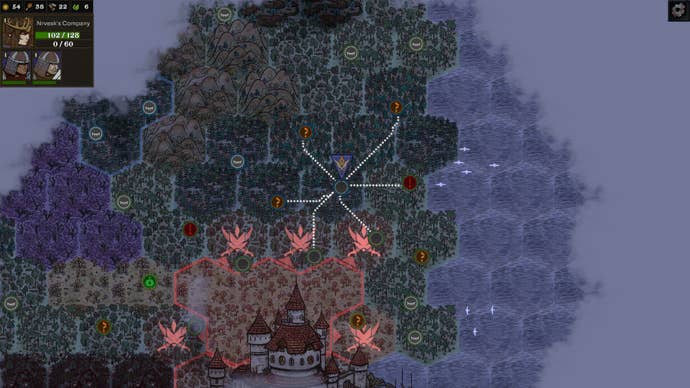My first game of Lost In The Open came to a sticky end in the borderlands, when my ragtag group of dog-eared bodyguards and hastily-recruited vagrants encountered the full flower of the Strathian military. Outnumbered, underlevelled and already bloodied, my warriors struggled to make a dent on the gleaming Strathian plate, and were swiftly surrounded and slaughtered.
It was at this point that I realised I had fled too efficiently through the mountains and forests. I should have spent more time grinding bandits, looting old forges, and putting aside resources for the inevitable midboss encounter. I’m not sure I can be blamed for my haste, though. After all, I am a nearly-dead king, the survivor of an assassination attempt during a diplomatic dinner, and there is a whole army sweeping over the countryside behind me.
The work of Stockholm-based Black Voyage Games, Lost In The Open is a “low-fantasy” tactics RPG that combines the roguelike running-away of FTL: Faster Than Light with something like the mood and art direction of Wildermyth and The Banner Saga. It casts you as King Nrvesk, known throughout the lands for being a total bastard, which is why somebody’s just shoved a knife into him.
Watch on YouTube
Starting out with a handful of surviving guards – two, on “Merciful” difficulty – you will flee north from the capital of Stratha, trying to reach your home realm of Ruedome before the Strathaian vanguard overtakes you in a sea of red hexagons. Each map node contains a battle, a resourcing opportunity, or a more ambiguous, perhaps multiple-part story quest. I met a nice noblewoman who wanted me to retrieve an heirloom from robbers, for example. I will leave you to discover whether I was unwise to accept.
Picking a fight in Lost In The Open can be very consequential. Units have a chance of dying permanently when KO’d, and even if they finish the fight upright, it’ll take them a while to heal afterwards, consuming medical supplies in the process. Capital-i Injuries may become Marred, distorting the unit’s stats, unless they are properly tended to. Needless to say, if King Nrvesk cops it, your run is over.
You’ll need to regularly risk battle, though, because it’s vital to level up and gather scrap and gold for bartering and upgrades. Sooner or later, there will be a combat you can’t avoid. You also need to make friends along the way – both recruiting soldiers, and forging alliances through quests that might pay dividends down the road.

The battle system itself is entertaining, if familiar. Characters act according to an initiative bar, and take more damage when attacked in the flanks or rear. Each unit has a degradeable armour layer that saves them from health loss, though some abilities can get around it. Warriors fall into such archetypes as crossbowmen who must spend action points to reload, tanky shieldbros who can absorb blows directed at adjacent friendlies, and screamy berserkers with power moves that deal extra damage based on how many foes have already been moidered.
It doesn’t seem as in-depth as the games I invoked in my intro, but I’m basing that observation on a cheeky 62 minutes with the Steam demo. The full game launches into early access on 26th September, with the first of three acts, plus “5 factions with 20 unit types (most are recruitable), 3 zones, 3 biomes, a wide variety of terrains, 6 boss encounters, and hundreds of unique events to discover.”
Among the things I’m curious about is whether King Nrvesk will have to mend his ways enroute to Ruedome – that “rue” is doing a lot of thematic heavy lifting here. The Steam page suggests that “you must recruit strategically, fight desperately and repent sincerely”, but perhaps I can “repent strategically”, instead. I’m pretty sure Machiavelli has something to say about timely apologies?






![The Lonesome Guild [RUNE] – MaxBit The Lonesome Guild [RUNE] – MaxBit](https://i3.wp.com/gamepcfull.com/wp-content/uploads/2025/10/Free-download-the-lonesome-guild-gamepcfull.jpg?w=100&resize=100,100&ssl=1)
